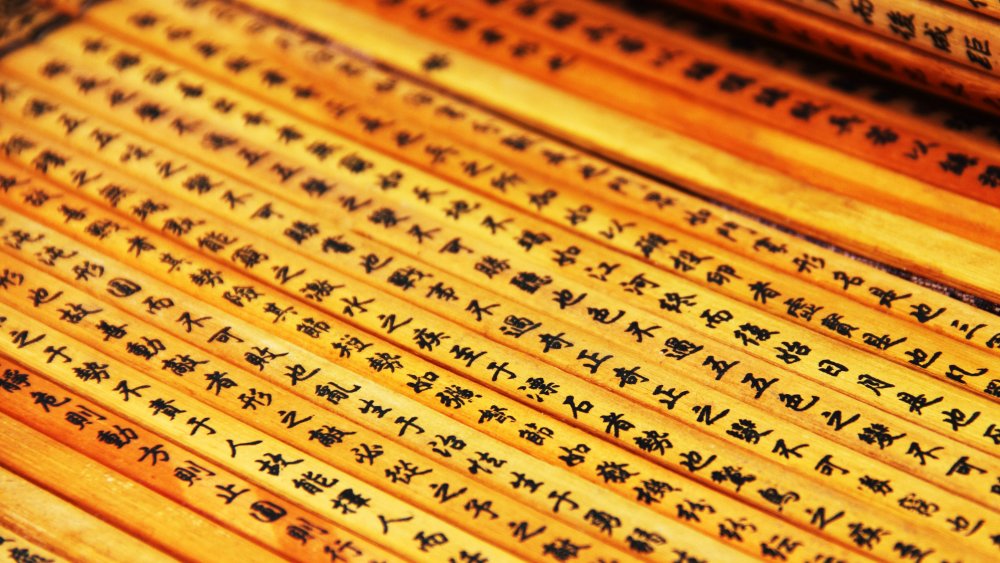Sun Tzu May Never Have Existed. Here's Why.
If there was ever a book for both military leaders and businessmen alike, it's The Art of War by the Chinese philosopher and strategist Sun Tzu. His writings detailed the Chinese army's military strategies, including information on weapons and the importance of intelligence tactics. The book's influence stretched far beyond the military world and has been used as a guide for business, sports, court cases, and even lifestyles. But while The Art of War definitely exists, the debate continues as to whether or not its ascribed author, Sun Tzu, wrote the book, or even lived.
Sun Tzu, sometimes spelled Sunzi, was said to be a general and advisor to one of the kings of China's feuding vassal states. During what History called the Spring and Autumn period, several feudal states started fighting against the Zhou dynasty, so it became imperative to figure out the best military strategy to outwit not just the emperor's army but those of other states as well. This period preceded the Warring states period from 481 BCE to 221 BCE. Sun Tzu supposedly made the state of Wu the most powerful of its time.
Little is known of Sun Tzu's life before he started working as a military strategist. Many historians feel that he just burst onto the scene. The Science of Strategy Institute claimed Sun Tzu was most probably a member of the nobility who may have lost lands because of the fighting. Only members of higher classes were as educated as he was.
Questionable sources
Much of what we know about Sun Tzu comes from two documents written between 788 BCE and 94 BCE, explained the Ancient History Encyclopedia. These were the Zhou dynasty's state records, called The Spring and Autumn Annals, and a book written by the historian Sima Qian. Historians argue if these two documents may have exaggerated. Sima Qian stated that Sun Tzu was born in the province of Qi, but it can't be proven if he was. The Science of Strategy wrote that if Sun Tzu existed, he reportedly died in 496 BC.
The Spring and Autumn periods, after all, was a time of great chaos, so many records may have been lost. Historians argue that if Sun Tzu were real and already had a reputation, then more things would've been written about him. They also contend that even though it was a very messy era of Chinese history, more people would still mention Sun Tzu for his successes.
No one even really knows his name for sure. The name Tzu, for example, is an honorific title, meaning master, said the Ancient History Encyclopedia. History also pointed out that no one can pin down an exact publication timeline for The Art of War. Some scholars believe it was written sometime in the 4th or 5th Century. There's even an argument that The Art of War is actually a compilation of different generals' military strategies and theories.
Lasting impact
Even if Sun Tzu isn't real, the impact of his writing has resonated throughout generations. Even the anecdotal stories about him gave insight into his military mind. History relates one story. When Sun Tzu began working for the King of Wu, the king decided to challenge his general. He told Sun Tzu to turn his harem of courtesans into an army. But when the courtesans failed to perform well, Sun Tzu beheaded two of the king's favorites in front of everyone. The courtesans obeyed after that. The king was so impressed that he put Sun Tzu in charge of his army. Fiction or not, it showed how much Sun Tzu would sacrifice in order to win. It was this kind of thinking that he imbued into The Art of War.
Over the centuries, The Art of War has permeated the halls of power. Sun Tzu's writings claimed that the best way to end wars was to fight swiftly, without resorting to games that prolong fighting. He wrote that soldiers and leaders must be adaptable. Armies need to be well-trained, but also know when to choose their battles. And of course, it was Sun Tzu who noted you should neither over- nor underestimate your enemies.
Whether or not Sun Tzu existed probably doesn't matter to the many world and business leaders who endlessly quote The Art of War.


